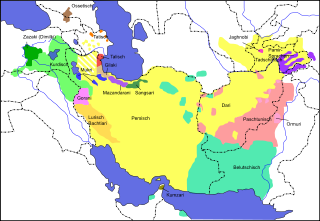
Back Beloetsji Afrikaans اللغة البلوشية Arabic بلوتشى ARZ Baluchi AST Bəluc dili Azerbaijani بلوچ دیلی AZB Белуджская мова Byelorussian Белуджки език Bulgarian বেলুচি ভাষা Bengali/Bangla Balotcheg Breton
| Balochi | |
|---|---|
| بلۏچی Balòci | |
 | |
| Pronunciation | [bəˈloːt͡ʃiː] |
| Native to | Pakistan, Iran, Afghanistan |
| Region | Balochistan |
| Ethnicity | Baloch |
Native speakers | 8.8 million (2017–2020)[1] |
| Balochi Standard Alphabet | |
| Official status | |
Official language in | |
| Regulated by | Balochi Academy, Quetta, Balochistan, Pakistan Balochi Academy Sarbaz, Sarbaz, Iran |
| Language codes | |
| ISO 639-2 | bal |
| ISO 639-3 | bal – inclusive codeIndividual codes: bgp – Eastern Balochibgn – Western Balochibcc – Southern Balochi |
| Glottolog | balo1260 |
| Linguasphere | 58-AAB-a > 58-AAB-aa (East Balochi) + 58-AAB-ab (West Balochi) + 58-AAB-ac (South Balochi) + 58-AAB-ad (Bashkardi) |
 The position of Balochi language among Iranian languages.[2] | |
Balochi (بلۏچی, romanized: Balòci) is a Northwestern Iranian language, spoken primarily in the Balochistan region of Pakistan, Iran and Afghanistan. In addition, there are speakers in Oman, the Arab states of the Persian Gulf, Turkmenistan, East Africa and in diaspora communities in other parts of the world.[3] The total number of speakers, according to Ethnologue, is 8.8 million.[1] Of these, 6.28 million are in Pakistan.[4]
According to Brian Spooner,[5]
Literacy for most Baloch-speakers is not in Balochi, but in Urdu in Pakistan and Persian in Afghanistan and Iran. Even now very few Baloch read Balochi, in any of the countries, even though the alphabet in which it is printed is essentially identical to Persian and Urdu.
Balochi belongs to the Western Iranian subgroup, and its original homeland is suggested to be around the central Caspian region.[6]
- ^ a b Balochi at Ethnologue (26th ed., 2023)

Eastern Balochi at Ethnologue (26th ed., 2023)
Western Balochi at Ethnologue (26th ed., 2023)
Southern Balochi at Ethnologue (26th ed., 2023)
- ^ "worldhistory". titus.fkidg1.uni-frankfurt.de. Retrieved 20 February 2022.
- ^ Spooner, Brian (2011). "10. Balochi: Towards a Biography of the Language". In Schiffman, Harold F. (ed.). Language Policy and Language Conflict in Afghanistan and Its Neighbors. Brill. p. 319. ISBN 978-9004201453.
It [Balochi] is spoken by three to five million people in Pakistan, Iran, Afghanistan, Oman and the Persian Gulf states, Turkmenistan, East Africa, and diaspora communities in other parts of the world.
- ^ "Table 11 – Population by Mother Tongue, Sex and Rural/Urban" (PDF). Pakistan Bureau of Statistics. 2017. Retrieved 25 November 2023.
- ^ Spooner, Brian (2011). "10. Balochi: Towards a Biography of the Language". In Schiffman, Harold F. (ed.). Language Policy and Language Conflict in Afghanistan and Its Neighbors. Brill. p. 320. ISBN 978-9004201453.
- ^ Elfenbein, J. (1988). "Baluchistan iii. Baluchi Language and Literature". Encyclopedia Iranica. Retrieved 30 December 2014.
Cite error: There are <ref group=lower-alpha> tags or {{efn}} templates on this page, but the references will not show without a {{reflist|group=lower-alpha}} template or {{notelist}} template (see the help page).